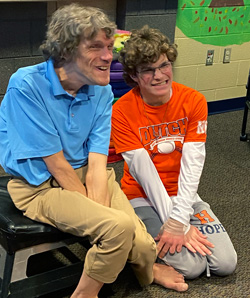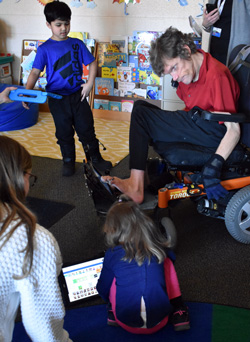Caledonia — Using an augmentative and alternative communication device (AAC), Chris Klein spoke to a room of speech-language pathologists, social workers and other special education staff at Dutton Elementary.
“Children need access to everyday language to develop communication and social skills,” Klein said in the automated voice his device uses. “In my opinion, it isn’t enough to give a child a device with only pre-programmed phrases. They need access to everyday language … like arguing, trash talking and sharing thoughts.”

Speaking to the district’s speech and language staff, he also discussed how creating connections and building language skills through social interaction should be the goal for young learners, not just meeting curriculum standards.
Dutton’s speech-language pathologist Deb Gaffner arranged Klein’s second visit to the school to share his experience using an AAC and advice for teaching students with cognitive impairments.
Funded by the Caledonia Educational Foundation, Klein’s schedule included two days of individual classroom visits, speaking to teachers and a school-wide assembly at Dutton.
‘Children need access to everyday language to develop communication and social skills.’
— Chris Klein
Sidney Bachman, Dutton Elementary’s speech-language pathology intern from Grand Valley State University, said she learned about using AAC with her students through hearing Klein’s experiences.
“It’s so important for anyone to build deep social connections, and people who use AAC face additional barriers to making these connections,” Bachman said. “We should work to include and embrace AAC users to help them build connections and achieve anything they set their minds to.”
Learning Language
Klein received his first AAC from his speech pathologist at 6 years old. After playing around with the device for a weekend, he said he could finally share his thoughts with his family.
“I had so many things to say as a child and a picture board wasn’t enough,” he said. “My AAC device gave me access to language and I learned self advocacy skills.”

Seven students at Dutton use AAC — or “talkers” — to build language skills, participate in classroom conversation and share what is on their mind. Symbols and pictures on a tablet supplement or replace speech or writing allowing students to communicate.
Born with cerebral palsy and unable to use his arms and hands, Klein learned to operate his talker with his big toe. Today, he drives his wheelchair and types on his computer and cell phone using his feet.
Based on his own experience, Klein advised teachers and staff that “limiting social interactions inhibits self-advocacy skills.”
His advice for teachers and parents about young learners using AAC: “Let them play around with their device. Babbling is normal for any 2-year-old.”
Kim Pyper, Caledonia Community Schools’ occupational therapist, said she admired Klein’s courage to overcome the barriers of a complex communication disorder.
“I aim to help remove barriers for students with disabilities and Chris reminded me that teaching students how to use their AAC devices in social situations and to advocate for themselves is key to success,” Pyper said.
Thanks to his AAC, Klein was mainstreamed into a regular classroom in third grade. Eventually, he graduated from Hope College with a bachelor’s degree in kinesiology and a master’s in divinity from Western Theological Seminary.
He recalled: “In my first class during my freshman year at Hope, my professor asked the first question and he was surprised when I raised my foot to give him an answer.”

Read more from Caledonia:
• ‘A Chance to Have a Meaningful Life’
• Students say school captures their hearts, in a good way











